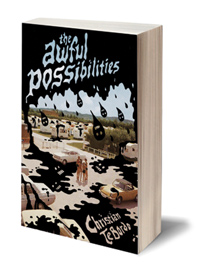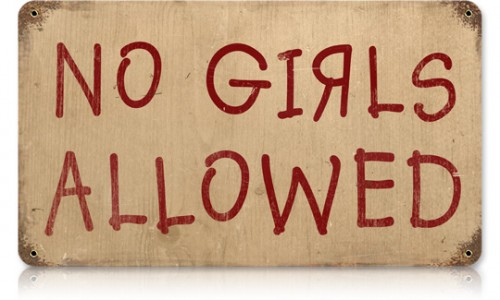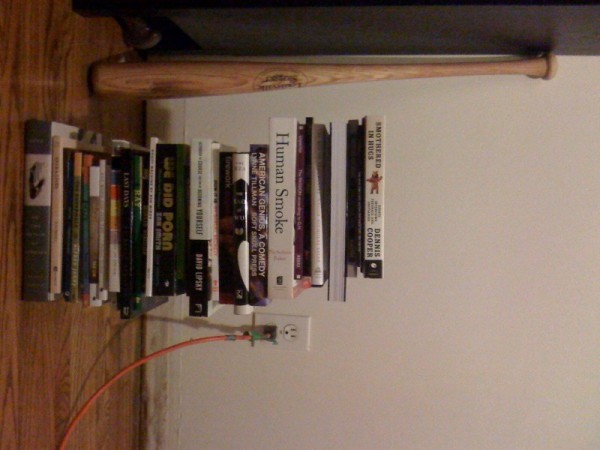The New Yorker: No Girls Allowed?
Anne Hays reads The New Yorker and she recently noticed that most of the articles, stories, poetry and essays in the past two issues were written by men. She wrote an open letter to the magazine wherein she discussed her concerns. I did not notice the gender discrepancy in recent issues because, to be honest, I’m reading issues from like May 2010. It’s pretty stressful how that magazine keeps showing up in the mailbox every week. There is a lot of pressure to keep up.
Boredom 2010
The other day I found myself waiting, and beside my waiting self was a newspaper. I looked at it. Of course, it was full of important stories about important people doing important things, and it would have been good of me to read about something of worth, but the only article I read the whole way through was one about a group of ‘Boredom Enthusiasts’ in London who had a conference last month. I have no idea why I was compelled to read about Boredom 2010 organizer James Ward‘s tie collection, which, as of June 2010 consisted of 55 ties, nearly half of which were solid-colored. “By December, his tie collection had jumped by 36%, although the share of single-color ties fell by 1.5%.” I must be channeling my inner Brit.
Only a day or two later a friend emailed me to ask if I had any favorite novels in which absolutely nothing, or almost nothing, happens. Oddly enough, none came to mind. I think this may be because I am often compelled by what may bore others and my definition of ‘nothing’ can be quite fluid depending on attention span or mood.
Of course there are the books about which people complain about nothing happens (High schoolers, I am looking at you.) The Old Man And The Sea is one but I am sure others (htmlgiant readers) might not categorize it in quite the same way. In David Markson’s Reader’s Block a different kind of nothing is happening, one in which an old man’s brain is sifting thoughts… Is it just me or do old men feature prominently in books about nothing and boredom? Makes it all the stranger that James Ward, mastermind behind Boredom 2010, is only twenty-nine. Someone cue the hand-wringing about the current generation.
Bernhard’s Shadow

In this interview at KCRW Bookworm, W.G. Sebald confessed his longtime attachment to Thomas Bernhard as an influence, mentor, and model. He also confessed to a longtime reluctance to confess his attachment to Bernhard for fear of being labeled simply a Bernhard derivative by those for whom it is convenient to attach such a label and use it to diminish the individuality of the work of a writer who simply has a less likely influence than another writer. (We rarely use “Chekhovian” or “Joycian” or “Faulknerian” as a critical diminutive, perhaps because they have influenced such a broad swath of writers that their own initial singularity has been diminished by the breadth of their influence.) READ MORE >
If you’re in NYC, tonight at 7 PM Vol. 1 Brooklyn will be hosting a panel on 90’s punk in Williamsburg, info here.
Spring Semester Started

I am teaching two courses this semester…here are the reading lists, feel free to follow along:
LIT 2230 – Global Literature
The European Avant-Garde 1900-1945
Alfred Jarry – Exploits and Opinions of Dr Faustroll Pataphysician
Tristan Tzara – The Gas Heart
Penelope Rosemont (Editor) – Surrealist Women: An International Anthology
Max Ernst – Une Semaine De Bonte: A Surrealistic Novel in Collage
Vitezslav Nezval – Valerie and Her Week of Wonders
Gherasim Luca – The Passive Vampire
Futurist, Dada, and Surrealist Manifestos
Antonin Artaud exerpts from The Theatre & Its Double
Clement Greenberg “Avant-Garde & Kitsch”
José Ortega y Gasset “The Dehumanization of Art”
LIT 2020 – The Short Story
Challenging Conventions:
20th-21st Century Experimental Short Stories
Gertrude Stein – “Composition as Explanation”
Susan Sontag – “Against Interpretation”
Ben Marcus – “Why Experimental Literature Threatens to Destory Publishing…”
R.M. Berry, Lance Olsen, Brian Evenson, Susan Steinberg, Michael Joyce – “The Question of Writing Now: FC2 responds to Ben Marcus”
Anne Carson – The Beauty of the Husband
Blake Butler – Scorch Atlas
Russell Edson – The Tunnel
Renee Gladman – Juice
Thalia Field – Point and Line
Steven Patrick Morrissey on Writing
I earn more than I thought I would when I became a poet
And no reason to talk about the books I read but I still do
Don’t leave it all unsaid
Well, I wouldn’t object to being approached, put it that way
They said they respect me, which means, their judgment is crazy
If you really concentrate on the Top 40 there aren’t really that many striking individuals so it is rather easy within that block to be anarchic
Artists aren’t really people. And I’m actually 40 per cent papier mache
I find agreeable people immensely disagreeable
I was always attracted to people with the same problems as me. It doesn’t help when most of them are dead
Am I looking in the mirror?
Any fool can think of words that rhyme
There are some bad people on the rise
Sell all of your clothes
We hate it when our friends become successful
The traditional viewpoint is to scowl, but I don’t understand that
Rejection is one thing – but rejection from a fool is cruel
There’s more to life than books you know, but not much more
When I Turn Off My Brain: An Interview w/ Christian TeBordo
 In the summer of last year, Featherproof released The Awful Possibilities, the fourth book by Philadelphia’s Christian TeBordo. It is an assemblage of extreme range in sound and direction, as TeBordo’s work manages to funnel a kind of well-orchestrated, rising mania across a range of perspectives and situations, including teenage suburban thug rappers planning a school shooting, a logic-fucked woman involved in shady black market business in a hotel, a dude trying to buy a new wallet, deathbed advice minds, and several other hybrid enactments than in other hands would lack the flair of TeBordo’s ability to funnel livelanguage and feeling into seemingly any kind of body. As says George Saunders: “Christian TeBordo shows that it is possible to be, simultaneously, a wise old soul and a crazed young terror.”
In the summer of last year, Featherproof released The Awful Possibilities, the fourth book by Philadelphia’s Christian TeBordo. It is an assemblage of extreme range in sound and direction, as TeBordo’s work manages to funnel a kind of well-orchestrated, rising mania across a range of perspectives and situations, including teenage suburban thug rappers planning a school shooting, a logic-fucked woman involved in shady black market business in a hotel, a dude trying to buy a new wallet, deathbed advice minds, and several other hybrid enactments than in other hands would lack the flair of TeBordo’s ability to funnel livelanguage and feeling into seemingly any kind of body. As says George Saunders: “Christian TeBordo shows that it is possible to be, simultaneously, a wise old soul and a crazed young terror.”
Last month, Christian and I took some time emailing about the book, Christian’s experience of influence by Brian Evenson and others, the process of assembling a text, getting along in sound and structure, approach, revision, and nudie pics.
* * *
BB: The Awful Possibilities is your first collection of short fiction after having published three novels. Do you see yourself more as a novelist, and is there a difference in your approach? Were these stories written over a long period of time?
CT: Let me answer these backwards, because that way it goes from easy to really hard. The stories in The Awful Possibilities were written over a little more than 10 years. One of the stories in there is the first I ever made that I considered a story. The most recent (the postcards), I sent to featherproof after they’d accepted the manuscript. Actually just before the book got laid out. I wrote and published my three novels during the same time. I don’t approach the forms differently when I sit down to write. For me it’s just the sentences and the persona that generates the sentences telling the larger work where to go. On the other hand, I try to do something different each time. People who read my last novel might recognize a sensibility or tendencies in The Awful Possibilities, but I hope nobody would be able to predict what one would be like having read only the other. The question of how I see myself is a little tougher. As a writer, I’m happy doing both. Stories are fun because sometimes you can just bulldoze through a draft in a sitting or two. Or you can spend weeks being really meticulous and crafty with a few paragraphs without getting disgusted by what you’re up to. Novels are fun because you have some sense of what you’re going back to each night and there’s more room to surprise yourself. The truth is, though, I feel more comfortable with short stories because I do want to be read, but I want my stuff to be an all-out assault, too, for now at least. I think people are more willing to put up with that for 10 pages than 200.
January 4th, 2011 / 2:13 pm




